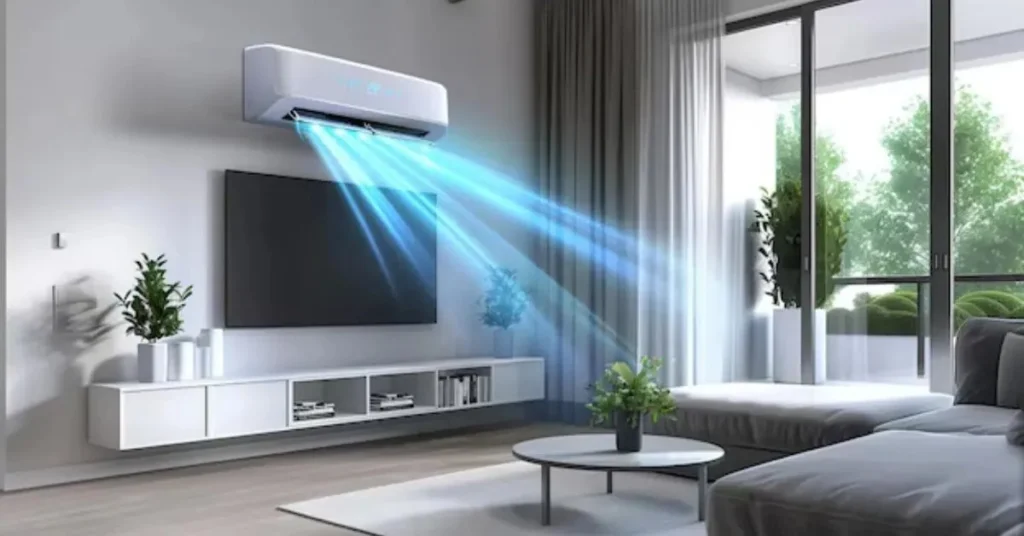Choosing the right air conditioner for your room in Dubai is not just about cooling the air. It’s about comfort, energy savings, quiet performance, and choosing the best model suited to the UAE’s climate. Whether you are searching for the best AC for a small room or trying to figure out which AC is best for home use, this guide will walk you through all the essentials to make an informed decision.
Understanding Your Room Size and BTU Needs
Start by measuring the size of your room. Calculate the square footage by multiplying the length and width. This number directly impacts the cooling capacity your air conditioner needs. For a small room up to 150 square feet, you may only need a 6000 BTU unit. Medium-sized rooms between 150 to 300 square feet may require a 9000 BTU unit. Larger spaces from 300 to 400 square feet may benefit from a 12000 BTU unit. This is where using a room size AC calculator can help determine the right AC capacity for your room.
For Dubai’s intense heat, consider around 30 BTUs per square foot. For example, a 1000 sq ft apartment might require between 24000 to 30000 BTU. It’s critical to avoid over or under-sizing your AC. An oversized AC will cycle off too quickly and leave the room humid. An undersized unit will struggle to cool the space, increasing electricity usage.
Split AC or Window AC for Small Rooms
Many homeowners are unsure whether to install a split AC or a window AC. A split AC is often the best AC for bedrooms due to its quiet performance, high energy efficiency, and aesthetic appeal. Split ACs are mounted on the wall and separate the compressor outside, making them quieter and more efficient.
Window ACs are more affordable and easier to install but tend to be noisier. They are better suited for temporary setups or rental apartments where budget and installation flexibility are primary concerns.
For long-term use and better cooling experience, especially in a quiet space like a bedroom, a split AC is recommended.
Inverter vs Non-Inverter AC for Home Use
The choice between inverter and non-inverter ACs plays a crucial role in electricity consumption and performance. Inverter ACs use variable-speed compressors that adjust based on room temperature, resulting in consistent cooling and reduced energy bills. They are ideal if you are looking for the most energy-efficient AC for bedroom 2025 models.
Non-inverter ACs operate at fixed speeds, consuming more energy and producing more noise. While the initial cost is lower, operational costs over time are higher. If budget allows, always choose an inverter model for long-term savings and comfort.
Energy Efficiency Matters
One of the most overlooked factors when buying an air conditioner is energy efficiency. In Dubai, where ACs run for most of the year, energy efficiency directly impacts your DEWA bill. Look for Energy Star-rated units or those with high Energy Efficiency Ratios (EER).
Modern models come with features like Eco mode, sleep mode, and programmable timers to optimize usage. Choosing an energy-saving AC for your room is a wise investment that pays off over time. Always check reviews and energy ratings before purchasing.
Top Brands to Consider for Small Rooms

Some of the best AC brands for small rooms in hot climates include Daikin, LG, Panasonic, and Gree. These brands are known for their reliable performance, energy efficiency, and quiet operation. Look for models specifically marketed as best AC under 1.5 ton for small room or quietest AC for home use.
If you are browsing with purchase intent, search phrases like “buy air conditioner for small room” or “top-rated air conditioners for apartments” can help narrow down your options. Many online stores and retailers offer detailed comparisons, reviews, and AC deals for home cooling.
Noise Levels and Bedroom Use
For bedroom use, quiet performance is non-negotiable. Aim for models with noise levels under 40 decibels. Split ACs are the quietest ACs for home use, ideal for light sleepers or home offices. Check product specifications and customer reviews to assess real-world noise levels.
High Humidity Considerations in Dubai
Dubai’s climate is not just hot, it’s also humid. Choosing an AC with dehumidification mode or dry mode is important. These settings remove excess moisture and help maintain comfort, especially in coastal areas.
Proper insulation, window coverings, and regular maintenance also contribute to effective humidity control. These air conditioning tips for hot climates ensure that your AC performs well even in peak summer.
Common AC Mistakes to Avoid
One of the biggest mistakes homeowners make is choosing the wrong size unit. An oversized AC will cool quickly but not remove humidity, while an undersized unit will run constantly. Other common errors include poor placement, lack of maintenance, and improper filter usage.
Also, avoid installing an AC near heat-generating appliances or in direct sunlight. Ensure that there is enough clearance for airflow around the indoor and outdoor units.
Installation and Professional Help
AC installation should be performed by certified technicians to ensure optimal performance. For residents in Dubai, we recommend checking our professional AC Installation in Dubai services. Our experts help you choose the right model, calculate BTUs, and ensure seamless installation.
Best Time to Buy an AC
The best time to buy an AC in Dubai is before summer hits. Off-season periods such as winter or early spring offer discounts and promotions. Look out for seasonal deals, combo offers, or online sales featuring top 10 ACs for small rooms.
Maintenance and Energy Saving Tips
To reduce AC bills in summer:
- Clean or replace air filters monthly
- Keep doors and windows closed when AC is running
- Use curtains or blinds to block sunlight
- Set your thermostat to 24 degrees Celsius
- Use fans to support air circulation
Regular maintenance also improves lifespan and cooling efficiency.
Conclusion
Choosing the right AC for your room involves careful planning, room size calculation, and understanding the differences between various models and features. Prioritize energy efficiency, quiet operation, and professional installation. For expert help with choosing or installing your AC in Dubai, contact our team through our reliable AC Installation in Dubai service.
Frequently Asked Questions
How to Choose the Right AC for Your Room in Dubai?
To choose the right AC for your room in Dubai, calculate your room size in square feet and match it with the appropriate BTU capacity. For Dubai’s hot climate, use 30 BTU per square foot as a baseline. For example, a 200 sq ft room may need a 6000–9000 BTU unit.
For bedrooms or quiet spaces, split inverter ACs are ideal due to their silent operation and energy efficiency. If you’re on a tight budget or living in a rental, a window AC might be a simpler option.
Always check for:
- Inverter technology (for lower DEWA bills)
- Energy efficiency ratings (EER or Energy Star)
- Noise levels under 40 dB for bedroom use
- Dehumidification mode for Dubai’s humidity
What is the difference between 1 ton and 1.5 ton AC?
1 ton equals 12000 BTU. A 1-ton AC is suitable for rooms up to 150 sq ft, while a 1.5-ton AC can cool spaces between 200 to 250 sq ft.
Is inverter AC better for small rooms?
Yes. Inverter ACs offer consistent cooling, energy savings, and quieter performance, making them ideal for bedrooms and small spaces.
Which type of AC is best for home use?
Split inverter ACs are the best choice due to their efficiency, quiet operation, and flexible installation.
How to choose the most energy-efficient AC?
Look for inverter technology, high EER ratings, and energy-saving modes. Choose models from reputable brands known for efficiency.
Should I get a split AC or a window AC for my room?
Split ACs are better for long-term use and offer quieter, more efficient cooling. Window ACs are suitable for limited budgets or rentals.
Can a bigger AC cool a room faster?
Yes, but it may short-cycle, leading to poor humidity control and higher energy consumption.
Does room insulation affect AC performance?
Yes. Well-insulated rooms maintain cool temperatures longer and reduce the workload on your AC.
How much electricity does a 1.5-ton AC consume?
A 1.5-ton AC typically uses between 1.5 to 2.0 kWh per hour, depending on usage and energy efficiency ratings.


